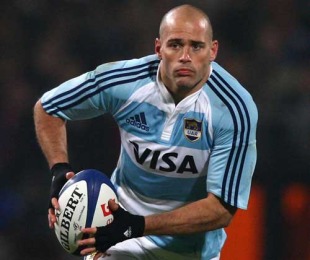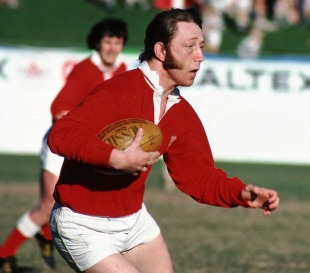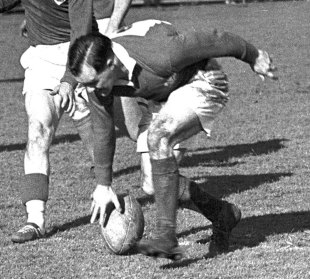|
Scrum Sevens
Hospital pass
Tom Hamilton
April 23, 2013

Felipe Contepomi will now focus on his medical career
© Getty Images
Enlarge
Following eight years of hard work, Jamie Roberts qualified as a doctor last week and in the process joined a lengthy list of rugby players who had mixed running out on to the field with their medical studies. With this in mind, and in tribute to Dr Jamie Roberts MBBCH BSc (Hons), this week's Scrum Sevens looks at a group of individuals who juggled rugby with the stethoscope.
Felipe ContepomiArgentina may have gained a Pope this year, but they will be losing one of their favourite sons at the end of the season. Contepomi has called time on a rugby career which has seen him scoop various domestic honours with Leinster and also excel on the Test stage for the Pumas. Alongside Juan Martin Hernandez and Agustin Pichot, the trio formed the crux of the 2007 World Cup side that shocked everyone else but themselves to reach third place in the global gathering. But there is absolutely no danger of Contepomi getting bored in retirement. He is on WADA's athlete committee and is the International Rugby Board's 'Keep Rugby Clean' ambassador. And he is also a qualified doctor, something he will now turn his attentions to in retirement and probably back in his native Argentina. And who's to say one day he work in the same practice as his Pumas team-mate Rodrigo Roncero who also has a batch of medical-related letters after his name.
Jonathan WebbA veteran of both the 1987 and 1991 World Cups, Webb cut his teeth on the domestic scene for west country rivals Bristol and Bath. It was at Bristol University where he studied medicine, for around 80 hours a week, and after retiring from the game in 1993, with 33 England caps to his name, he focused on his career as an orthopaedic surgeon. His career has incorporated time in Sydney and he was part of the medical staff for the 2000 Olympic Games while his feats in his specific field saw him listed on the Specialist Register of the General Medical Council. He currently runs his own clinic in Bristol.

JPR in action for Wales
© Getty Images
Enlarge
JPR WilliamsJohn Peter Rhys Williams will always have his place in Welsh rugby history after his key role in their dominance of northern hemisphere stage in the 1970s. He was the thorn in England's side - playing them 10 times and never losing - and helped the Lions win back-to-back series in 1971 and 1974. JPR's famous sideburns prompted an outbreak of similar styles in and around the Valleys and he is now mentioned in the same breath as other greats such as Gerald Davies and Gareth Edwards. While JPR was immensely talented on the field - and also on the tennis court - he was also a equally adept in a hospital's theatre. He was the son of a doctor and medicine seemed to be JPR's inevitable path in life. He retired in 1981 to concentrate on his career as an orthopaedic surgeon and had previously summed up both aspects of his life, rugby and medicine, saying: "I used to say that I spent half my life breaking bones on the rugby field then the other half putting them back together in the operating theatre."
Karl MullenOne of Ireland's finest players, hooker Karl Mullen led the country to their first Grand Slam in 1948. He was their inspirational leader, the man around whom the rest of the team was formed. Prior to what proved to be their clean-sweep clinching victory, his reported message to his side was simple: "This is it boys. Boot, bollock and bite". Two years later and the "quietly spoken", according to Clem Thomas' epic work on the Lions, Mullen was the man charged with leading the famous touring side on their 1950 tour of New Zealand and Australia. They failed to register a win over the All Blacks but they came away from their cross-Tasman rivals with a 2-0 victory. After hanging up his Ireland and Leinster boots, Mullen went on to forge a career as one of the country's leading gynaecologists.
Jack Matthews

The late, great Dr. Jack in action for Wales
© PA Photos
Enlarge
One of Wales' hardest players, Dr. Jack, as he was affectionately known, carved his place in both rugby and boxing's history. On the rugby scene he played 17 for Wales and toured with the Lions in 1950 to New Zealand - a decision which cost him over £5,000 in fees for a doctor to step into his shoes while he was abroad. And in the ring, he held the great Rocky Marciano to a draw over three rounds in 1943. He would have had far more caps than his total had it not been for the outbreak of the Second World War in 1943. But in the time he played rugby, he formed a formidable centre partnership alongside Bleddyn Williams. After calling time on the game, Dr. Jack continued his medical career and toured with the Lions in 1980 as their doctor. He continued his involvement in boxing and was the medical officer to the Welsh Boxing Association.
Rob WainwrightThe formerly named Captain Robert Wainwright RAMC toured with the British & Irish Lions in 1997 and played the third Test against the Springboks. A towering back-row, Wainwright turned out 37 times for Scotland and learnt his medical craft at Cambridge University - where he won Blues in both boxing and rugby. Alongside his international rugby career, Wainwright was a medical doctor with the British Army but he left this post to carve out a career in farming. But he still holds a place in rugby folklore having saved a man in 1995 who suffered a heart attack watching a game in London. He now manages a farm and a bed and breakfast with his wife on the Isle of Coll in Scotland - an island with a population of 220.

Boks and Sharks prop Jannie du Plessis © Getty Images
Enlarge
Jannie du PlessisOne half of the Du Plessis brothers who form a key part of the Springboks' front-row, Jannie has so far won 42 caps for South Africa. Turning out for the Sharks alongside brother Bismarck, the Du Plessis are some of Durban's favourite sons and he is likely to continue being a familiar face after hanging up his boots come the end of his career. Du Plessis is a qualified doctor, gaining his degree from the University of Free State, and continues to practice medicine alongside his professional career. He runs a HIV clinic in Durban's military hospital and was reportedly performing a caesarian section when he received his first call up for international duty back in 2007. And Du Plessis was back in the headlines in 2010 for his medical exploits when he saved a man's life after playing a Test against France. He was walking towards the team bus when he saw a man choking on a piece of meat. The Heimlich Manoeuvre failed so Du Plessis was resorted to scratching the piece of meat out of the man's throat. © ESPN Sports Media Ltd. Tom Hamilton is the Assistant Editor of ESPNscrum.
|
Live Sports
Communication error please reload the page.
-
Football
-
Cricket
-
Rugby
-
- Days
- Hrs
- Mins
- Secs
F1 - Abu Dhabi GP
Abu Dhabi Grand Prix December 11-131. Max Verstappen ()
2. Valtteri Bottas (Mercedes)
3. Lewis Hamilton (Mercedes)
4. Alexander Albon ()
5. Lando Norris ()
6. Carlos Sainz Jr ()
-
ESPNOtherLive >>
Golf - Houston Open
Snooker - China Open
Tennis - Miami Open

